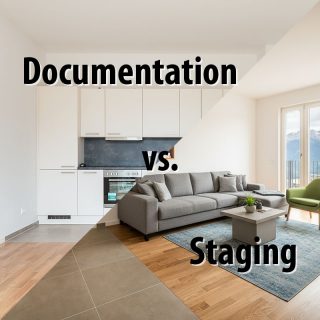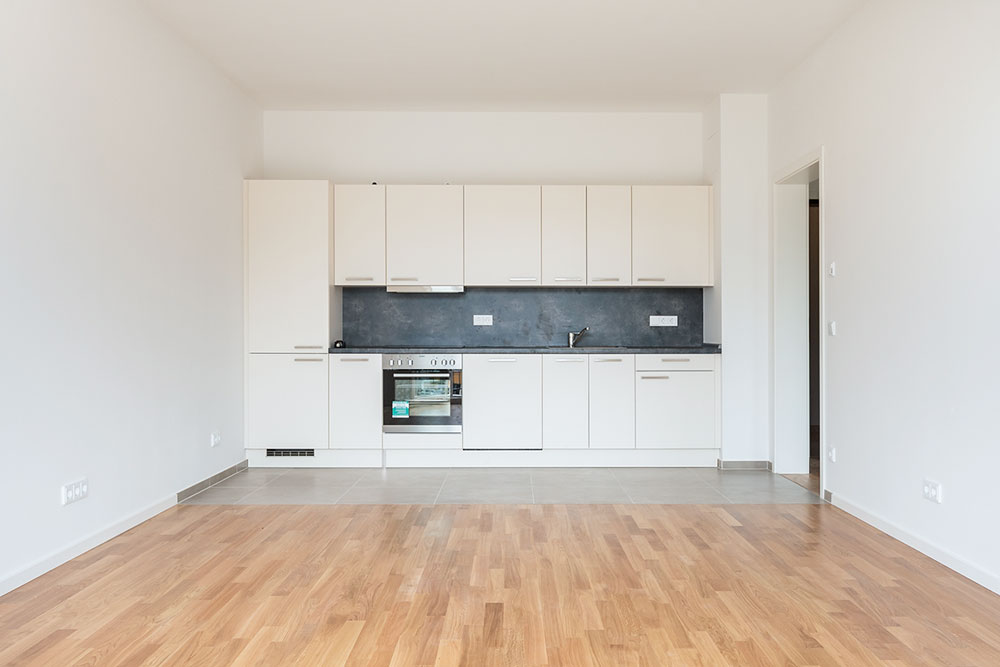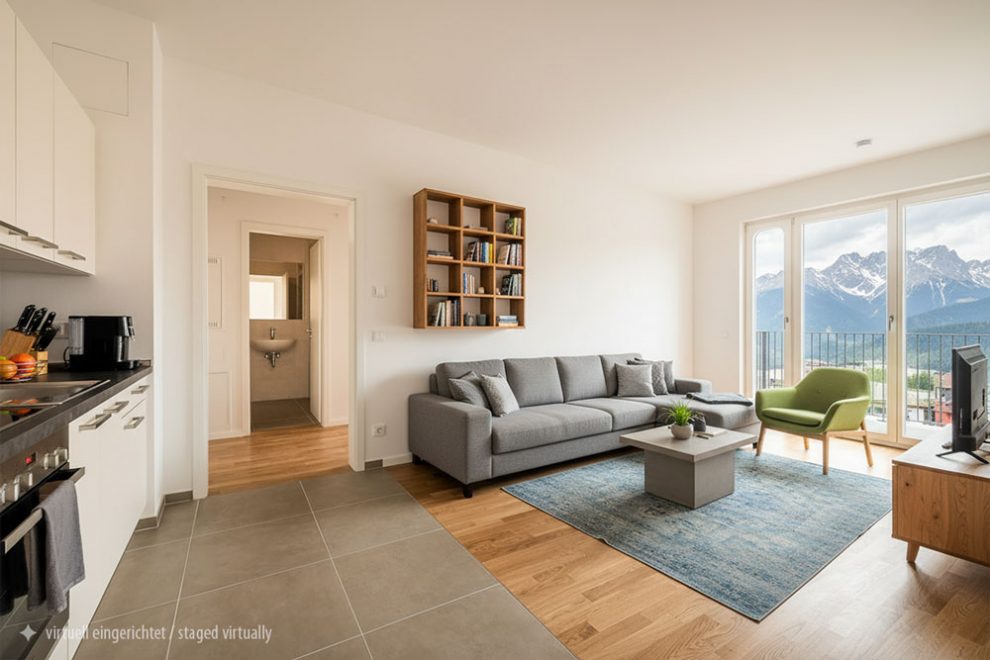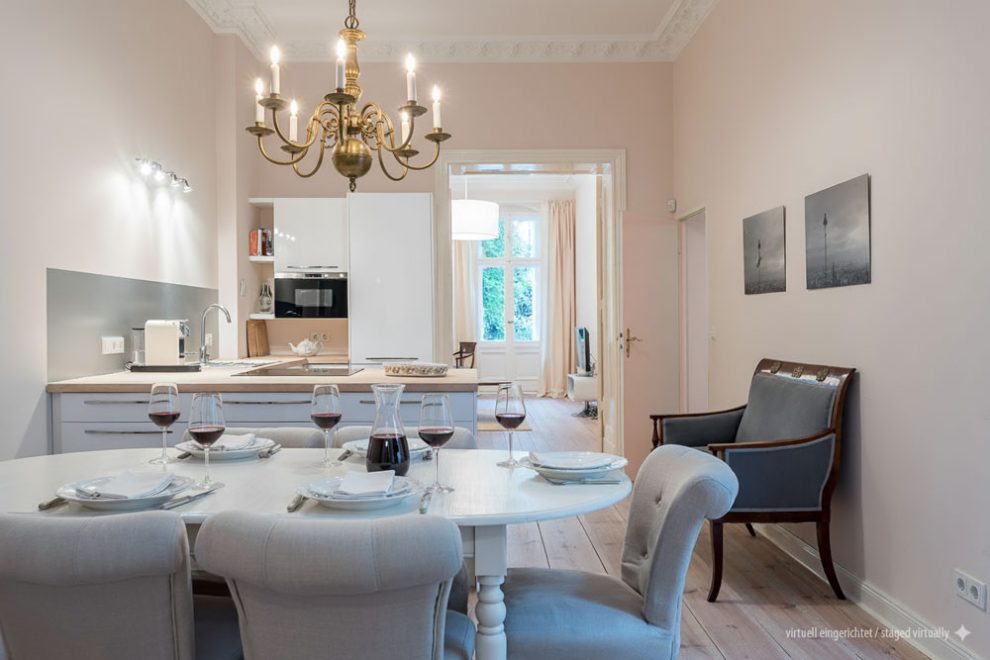 Real estate photography is much more than a simple record of spaces. Photographs should inform, guide—and above all, spark emotions. For most prospective buyers or tenants, the decision to explore a property further is made within seconds of seeing the photos. That makes real estate images more than neutral documentation: they are a powerful sales tool.
Real estate photography is much more than a simple record of spaces. Photographs should inform, guide—and above all, spark emotions. For most prospective buyers or tenants, the decision to explore a property further is made within seconds of seeing the photos. That makes real estate images more than neutral documentation: they are a powerful sales tool.
Real Estate Photos as Documentation – The Factual Foundation
Documentary real estate photography shows a property as it truly is. The camera captures rooms, proportions, and details as neutrally as possible.

Clean documentary photo of a kitchen-diner in a central perspective with neutral colors.
Advantages:
- Accurate impression for prospects.
- Photos match floor plans easily.
- Trustworthiness is preserved.
Especially in markets with high demand, this sober presentation is often sufficient. But in times of intense competition, pure documentation can quickly become boring.
Important: When documenting, it’s important to ensure that the images are still created according to the eight basic rules for good real estate photography. Snapshots taken at random are taboo.
Real Estate Photos as Staging – Turning a Property into a Stage
Staged photography deliberately uses composition, perspective and lighting to make a space not only correct but also appealing—highlighting its strengths rather than deceiving.

The same room as before, with (virtual) staging by added furnishings and slightly warmer, inviting lighting. The dynamic angle from the corner allows for more impressions of the interior and exterior.
Usual elements for staging:
- Strategic lighting to enhance mood.
- Wide-angle lenses for a more spacious feel.
- Home staging or small decorative accents as visual anchors.
- Shooting at specific times of day for atmospheric light.
Emotions – The Decisive Factor
Real estate purchases are emotional decisions. Photos that stir feelings remain in the viewer’s memory and generate real interest.

A set dining table creates authenticity (and prevents large empty surfaces in the foreground).
Examples:
- A bright, sunlit living room conveys warmth and comfort.
- A well-lit kitchen symbolizes quality of life and togetherness.
- A sunset balcony image evokes relaxation and leisure.
Striking the Balance: Honesty Meets Impact
Balancing documentation with staging is the real art. Too much staging risks false expectations and loss of trust; too little loses emotional appeal.
Recommended approach:
- Documentation as the foundation
- Staging as the enhancement.
Practical Tips: Adding Emotional Power to Your Photos
- Use natural light: Daylight makes rooms feel more attractive and lively.
- Use color strategically: Warm tones create comfort; crisp contrasts create freshness.
- Capture meaningful details: A cozy reading nook or a neatly set table can anchor emotion.
- Mind symmetry and lines: Orderly composition conveys calm and trust.
- Highlight outdoor features: Gardens, terraces, and balconies are emotional selling points.
Emotions in the Digital Sales Process
In today’s digital-first marketing, emotional photos are especially valuable. Listings that evoke emotions stand out on portals and social media, and typically achieve more clicks and viewing appointments.
Conclusion: Emotions Are Key
Real estate photography always moves between documentation and staging. The ideal solution combines both approaches and leverages emotions in real estate photography to transform properties into desirable homes.
📸 Professional Services
PrimePhoto delivers professional, emotion-driven photography that is accurate, attractive and persuasive.
Book a professional photo session
🎓 Workshops & Training
Learn to create compelling real estate photos yourself with our hands-on courses:
- Real Estate Photography with a Digital Camera
- Real Estate Photography with a Smartphone
- Editing Real Estate Photos

